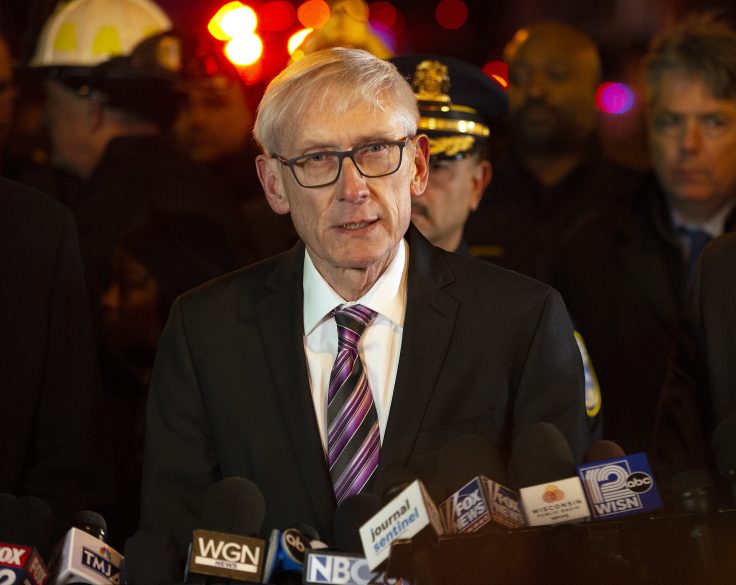Two Wisconsin citizens are challenging the state's stay-at-home order in court, arguing the executive order is unconstitutional because it singles out religious and political expression.
Democratic governor Tony Evers's "Safer at Home" order prohibits public or private gatherings of more than 10 people except under specific circumstances, such as shopping. It also restricts religious gatherings to fewer than 10 individuals. The lawsuit argues that Evers's policy limits the constitutionally protected religious and political expression of Wisconsin citizens, according to Charles Cooper, the lead attorney for the plaintiffs.
"The point isn't that the state doesn't have a compelling interest in addressing this health care crisis. We concede and recognize that," Cooper told the Washington Free Beacon. "The point is that the state can't single out or discriminate against and disadvantage individuals who seek to leave their homes for these constitutionally protected purposes."
The lawsuit comes in the midst of uncertainty over the future of statewide lockdown orders. Legal challenges have been filed against the policies in a number of states from groups that have faced limitations due to the coronavirus, including businesses, Second Amendment activists, abortionists, and churches. Cooper filed the lawsuit on behalf of two Wisconsin citizens who see the order as overreaching and unjust in its treatment of religious gatherings.
"The state has clearly gone too far, needlessly infringing our most basic constitutional liberties to an extent that is without precedent and that would have been virtually unimaginable in a free society just two months ago," Jeré Fabick, one of the plaintiffs, said.
The lawsuit acknowledges the gravity of the coronavirus crisis, which has claimed more than 70,000 lives and crippled economic activity in the United States. The suit argues that the state's restrictions, while enacted in good faith, have needlessly trampled on the rights of residents.
The plaintiffs take issue with the singling out of religious gatherings, along with the order's effective ban on any political demonstration and nonessential travel. Certain gatherings, such as at grocery stores, are allowed, though individuals are encouraged to practice social distancing. The plaintiffs say that religious believers have been denied an opportunity to adopt similar safety measures and instead face blanket shutdowns from the Evers administration.
"The petitioners we represent are entirely willing to abide by general masking and social distancing protocols that the state has put in place for other types of groupings," Cooper said.
Cooper said the Justice Department has indicated its support for lawsuits challenging stay-at-home restrictions. In April, Attorney General William Barr issued a memorandum stating that the department will be focusing on overly stringent lockdown orders.
"I am directing each of our United States Attorneys to also be on the lookout for state and local directives that could be violating the constitutional rights and civil liberties of individual citizens," Barr wrote. "If a state or local ordinance crosses the line from an appropriate exercise of authority to stop the spread of COVID-19 into an overbearing infringement of constitutional and statutory protections, the Department of Justice may have an obligation to address that overreach in federal court."
Religious liberty suits have found mixed success in court. A federal judge in Kansas blocked the implementation of a stay-at-home rule because the ban on gatherings of more than 10 people violated religious freedoms. A federal judge in California, however, rejected a pastor's claim that California's lockdown order violated First Amendment rights.
Some states have begun to lift restrictions on businesses and organizations that were deemed nonessential while emphasizing the need for social distancing and attention to hygiene. Others argue that it is too soon to lift the orders. New models indicate that deaths from the coronavirus will exceed 100,000 by the end of the summer, and President Trump's statement that there could be a vaccine before the end of the year has been met with skepticism.
Evers issued a roadmap for getting Wisconsin back to normal after the worst of the coronavirus pandemic has passed. The criteria include 14 consecutive days of declining coronavirus case counts and hospitals showing sufficient treatment and testing capacities. The timeline for the recovery is not specified.
Evers's office did not respond to a request for comment on the lawsuit.
Cooper stressed the importance of balancing constitutional rights with concerns about public health.
"The executive officials in Wisconsin have quite understandably taken firm action to protect the public health of the citizenry. But they’ve gone too far in their restrictions on fundamental constitutional liberties," Cooper said. "In that respect, they have used a machete where the Constitution requires that they take care to use a scalpel when they're restricting those liberties."
